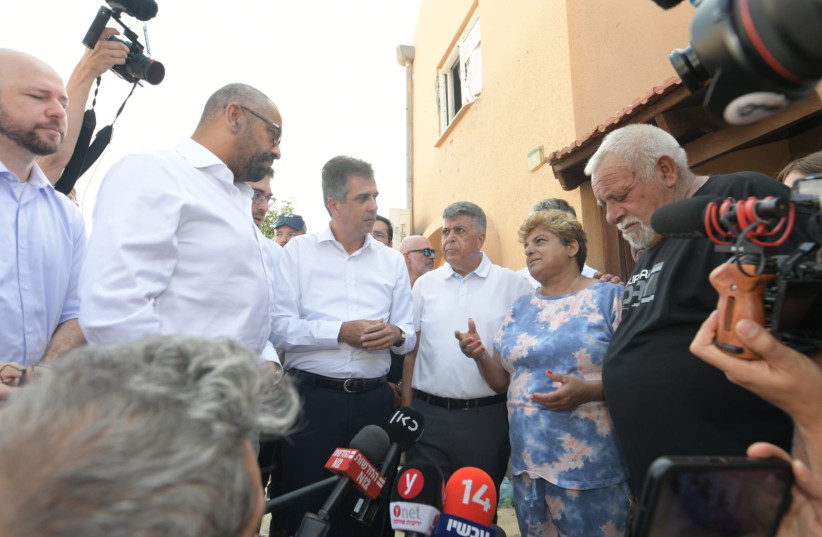“Rachel from Ofakim" is somewhat disjointed, but it is very much a product of its time and the circumstances of its creation. The dramatic scenes are overshadowed by powerful archival footage, yet even these scenes mainly support the portrayal of Rachel Edri herself.
The film provides an opportunity to see her as a whole person, not merely as an icon of inspiration.
Amid the horrific news of October 7, Rachel Edri’s heroism provided a rare moment of relief. Though it wasn’t a happy story—it involved couples held hostage by terrorists—it was still a hopeful moment in an ocean of despair.
People quickly fell in love with her. Rachel appeared on the cover of For Women magazine in heartwarming illustrations, articles featuring cookie recipes, on T-shirts, and even in animated videos depicting her as Wonder Woman with exploding cookies.
The story’s dramatic and cinematic potential was immediately apparent, but few expected a film announcement so soon. By the end of October 2023, it was already in the works.

Indeed, just a year and a week after that tragic day, "Rachel from Ofakim" premiered. The film, shot in July 2024, starred Merav Gruber as Rachel and Albert Iluz as David Edri.
The speed of its release may raise concerns about whether it was rushed, but Zohar Wagner’s film embraces this urgency.
It exists within the trauma without attempting to heal wounds still raw. The movie focuses on the gap between "Rachel," the iconic figure who saved the day with pots and calm determination, and Rachel Edri, the woman who never asked to be a hero.
Like Wagner’s Savoy from 2022, "Rachel from Ofakim" blends documentary with drama, combining actual footage with staged reconstructions.
Early in the film, the director suggests that Rachel reenact her actions for the camera instead of giving testimony. Edri agrees but quickly realizes the emotional toll is too great and insists on casting a professional actress.
Three levels of storytelling
The film unfolds on three levels—behind-the-scenes footage of the production, reenacted scenes, and actual documentation from phones, drones, and other footage of the attack.
Rachel is shown on set where the Edri family home is being rebuilt. She expresses concern about the destruction of the walls, talks to the crew about her overwhelming feelings during the reconstruction, and occasionally breaks down in tears. At other times, she takes charge, repositioning actors and correcting inaccuracies in the script.
Edri is the heart of this film, and her presence alone justifies its creation. Even in her most painful moments, she opens up to the camera—not to set an example or achieve something, but because of her unique mix of honesty and charisma. While she does have an instinct to please, the film’s framework seems to give her some relief. She no longer has to recount the entire story from start to finish; instead, her memories flow naturally between scenes.
While the film's dramatic aspects might be its weakest point, they were never intended to draw the audience into a widely known story.
The footage serves more as a documentary tool—an indirect way to address the event without confronting it head-on. Even without these scenes, the film’s impact would not be diminished.
They exist to help Rachel reflect on what she endured and what she continues to survive. In one scene, she mentions that she could fall asleep easily for the first time since the incident. A crew member points out that it was likely due to exhaustion from the shoot.
In another moment, she speaks with the actress portraying her, and Gruber shows sensitivity and admiration in this unusual situation. At one point, Gruber even tells Edri, "You’re the real actress here—because you saved your life."
One of the film’s most emotional moments comes when Albert Iluz asks Rachel whether he truly captures the essence of David Edri, the man she lived with for decades and whose life she saved on that terrible day.
Personal tragedy
This brings us to the heartbreaking tragedy hovering over the film—David Edri’s death in February 2024, just four months after October 7. Rachel and David’s relationship had an agonizing dynamic.
They both experienced the same terror, but Rachel took action while David was largely passive. Her ability to communicate with the terrorists and manage the situation gave her a sense of strength. As a result, Rachel feels immediately familiar to those who meet her, while David’s character is pieced together gradually through stories and rare photos.
Rachel describes David in the aftermath as someone who withdrew, unable to share the pain and horror he carried. "David wasn’t feeling well, he didn’t speak," she says in the film. "I could see in his face that it really hurt him."
"Rachel from Ofakim" may be scattered, but it reflects the urgency and pain of its time. The dramatic scenes are secondary to the powerful archival footage, yet they also support Edri and her story—not only from that day but also from the days before and after.
As viewers, it’s difficult to know whether reenacting the traumatic events brought her relief or caused more anguish. But the film allows us to see her as a full human being, not just an icon of strength. Now, she deserves to rest—preferably far from the cameras, at least for the foreseeable future.
